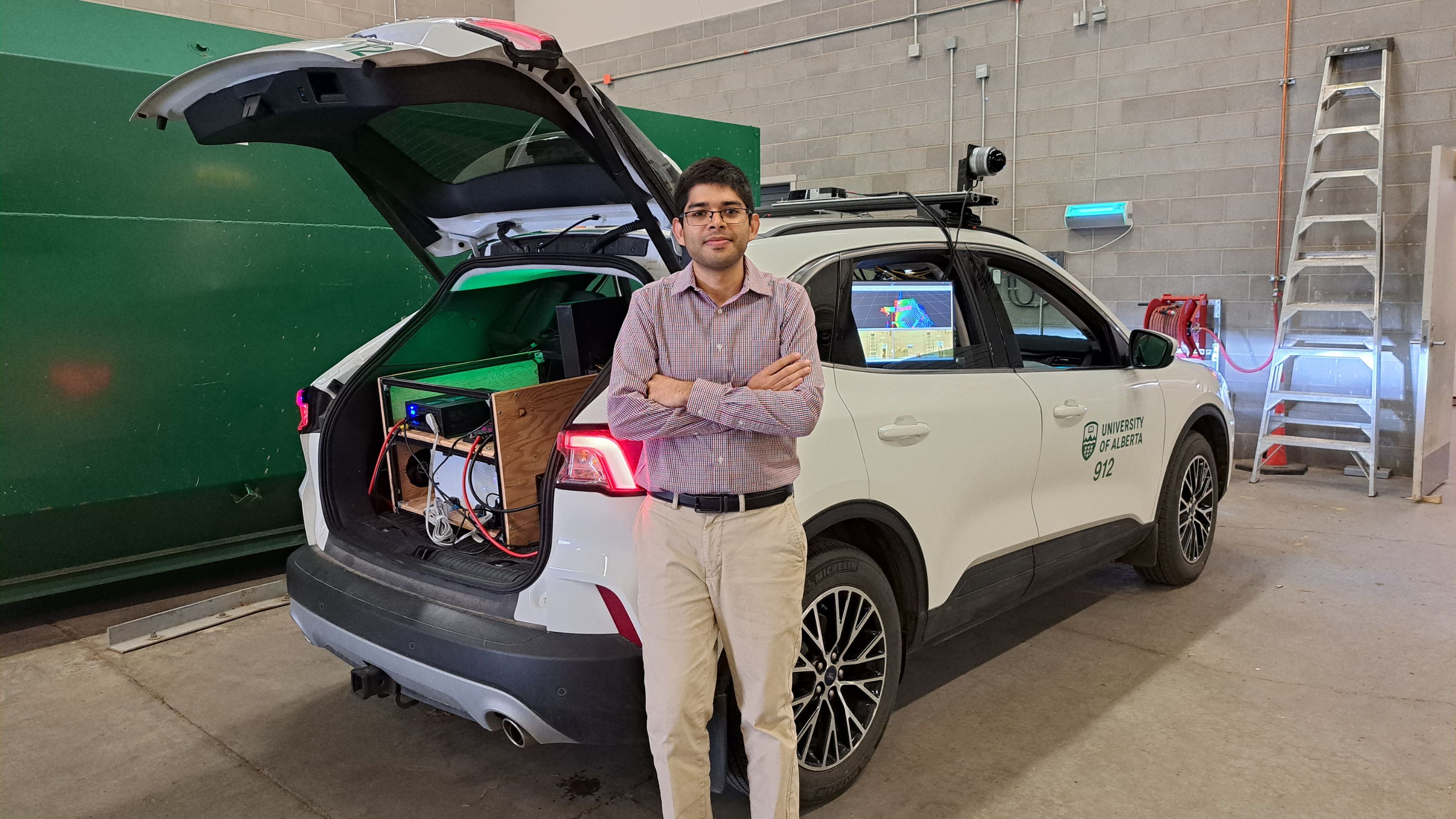Throughout June 2023 we are showcasing interdisciplinary artificial intelligence (AI) research at the U of A that demonstrates how the university is leading with purpose to make AI safer, reliable and more just.
Neel Bhatt is a visiting research scholar in the Department of Mechanical Engineering working on autonomous driving. Specifically, Neel looks at how to predict what non-AI actors would do in a certain scenario. In this spotlight, Neel explains the importance of practical testing in creating holistic data.
What is AI?
Artificial intelligence is basically used as a model for the human brain and put into autonomy using computers. Instead of us using our own capabilities to think we're trying to mimic that on the computer level.
Briefly explain your field of research and how it involves AI.
I'm working on autonomous driving, but specifically on predicting what other actors would do. Let's say you have people or other cars surrounding an autonomous vehicle. My research is on predicting what these other actors would do in the future, because that is what’s needed for the AI software to reason.
How is AI affecting our lives and what is a common misconception people have?
Right now AI is advancing a lot and it’s impacting us in that many of the things we're doing repeatedly can be automated. One of the misconceptions people have is that AI is going to take over the world. That's certainly not true. It's meant to aid us in our work and is actually for our benefit.
What is the long term future of AI? And how is the U of A leading in this space?
The long term future, at least in autonomous driving, is a lot of testing. There are a lot of theories out there, but AI needs a lot of diverse data to work with. In the future we will have holistic data that represents the scenario we're trying to test.
I think the U of A is leading in this aspect because we have labs, such as ours, that are actually working with real vehicles in addition to simulation data. That really helps to test all of the code that we've written with actual systems and ensure safe operation.
What do people entering the workforce need to know about AI?
It's really important for people, especially students, to have a research background going into AI, because AI is not yet fully mature. More research is needed into specific structures or specific models that work well in a practical scenario. I think it would benefit students to have some sort of training in terms of research for AI such as training different models, but at the same time have exposure to practical testing. In our case, for example, experience with vehicles so that they can actually test their models on computers and on vehicles instead of just on a simulation.
This conversation has been edited for brevity and clarity.

About Neel
Neel is a visiting research scholar in the Department of Mechanical Engineering at U of A working on the NODE lab's autonomous vehicle. His research is centered at the intersection of perception, state estimation, prediction, and decision making for autonomous driving.
Neel received his PhD in Mechatronics Engineering from University of Waterloo. During his PhD, he led efforts on the WATonoBus project at MVS Lab working on software and algorithmic development of perception and prediction modules required for Canada’s first autonomous shuttle bus approved via the ministry’s autonomous vehicle pilot. He also interned at GM R&D where he worked on deep learning-based state estimation.
Neel received his Bachelor's degree in Mechanical Engineering with focus on Mechatronics and Robotics from University of Toronto. During his bachelor's, he conducted research with Professor Yu Sun on micro and nano robotics and interned at Clearpath Robotics and was awarded NSERC Research Awards for both.
Innovator Spotlight is a series that introduces you to a faculty or staff member whose discoveries, knowledge and ideas are driving innovation.
Do you know someone at the U of A who is transforming ideas into remarkable realities? Maybe it’s you! We are interested in hearing from people who are helping shape the future, improving quality of life, driving economic growth and diversification and serving the public. We feature people working across all disciplines, whether they are accelerating solutions in energy, shaping the evolving landscape of artificial intelligence or forging new paths in health and Indigenous leadership.
Get in touch at blog@ualberta.ca.
